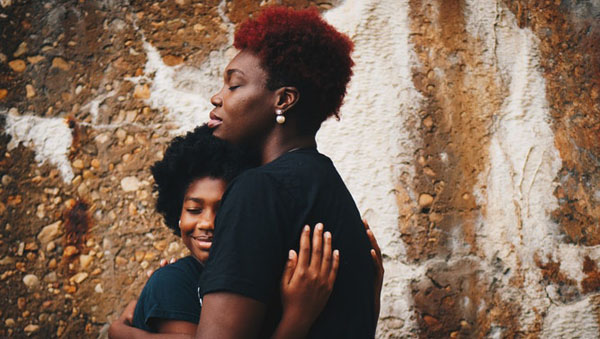By Yvonne Sam
Social and Political Commentator
 Hardly a day passes that someone, struggling with the often conflicting rules of race, as well as curiosity, does not pose the following question: how come Black people are so screwed up?
Hardly a day passes that someone, struggling with the often conflicting rules of race, as well as curiosity, does not pose the following question: how come Black people are so screwed up?
Most people skirt around it, nonetheless, it does not matter if the approach is indirect or brutally inquisitive, with little concern of offending those from whom they are soliciting information, it rings the same way. The Black community, long regarded as a complicated map of dysfunction, is battling a silent issue — the treatment Black daughters receive at the hands of their Black mothers.
It remains a silent issue because, within the Black community, Black mothers are held to such high regard, that if anyone speaks out about mistreatment or abuse, they will be the ones who get harped on, for speaking the truth. It is known in the Black community how mothers destroy their daughters.
In fact, you can Google the topic and up pops an overflow of topics, discussing the relationship between Black mothers and their sons. Additionally, most newspaper articles are geared towards talking and emphasizing about how Black mothers are destroying their sons, but on the converse, never anyone talking about how they are destroying their daughters.
The disturbing and sad reality is that many Black women are oftentimes suppressed by their mothers, with negative and discouraging remarks. It could be either mother or grandmother, but either way, daughters are destroyed by their mothers in some way, shape or form, and just cast aside for their brothers. Apparently they are not seen as a priority, which fuels into how many Black women are dealing with emotional, mental, financial, and spiritual discord.

Photo credit:
(c) Can Stock Photo / monkeybusiness
Many daughters and granddaughters are vulgarized for their career, marital and personal choices, and face a lot of hardship if they make choices that benefit them. Yes, daughters are the ones who do not have a lot of freedom to enjoy their lives, while everyone else is free to enjoy theirs. Somewhere mom and/or grandma are making it hard for that daughter or granddaughter to have a life. It is alright if her brother does what he wants, but she cannot, and if she attempts to do something that improves her life, it’s a big problem.
The Black community shields and protects mothers and grandmothers and turns a blind eye to the way daughters and granddaughters are treated, yet they excuse the behavior of sons and grandsons, no matter how trifling they are. Some of the effects of how mothers and grandmothers treat their daughters and granddaughters, are lowered self-esteem, increased self-loathing, developing eating disorders, and decreased socialization. There is little to be said and much unknown about, how young Black women are, oftentimes, the casualty of their mother and grandmother’s insidious ways.
Viewing the level of singlehood of young Black women also points to how many of them have mothers and grandmothers, who discourage them from dating, or had an active hand in destroying their marriage or relationship. It is no guarded secret, but a well-known fact, that more than half of young Black women are, in fact, single and have never married.

Photo credit:
(c) Can Stock Photo / monkeybusiness
Yet science does not look into the sociological and psychological aspect, into why so many are, in fact, single, and those who deign to take the time to research, can literally look at what part a Black mother or grandmother played in that woman’s single status.
From a young age Black women are conditioned to learn basic skills in cooking, cleaning and housekeeping in preparation for marriage. Also the change in generational norms have also made it possible for many young Black women to have more choices in their lives, as to whether they further their education or get married and have families.
However, when daughters choose things that are beneficial to their lives it may not sit well with their mothers and grandmothers. The simple reason being, that they want them to live their lives, according to mother and grandma.

Photo credit:
(c) Can Stock Photo / monkeybusiness
Not wanting to be the harbinger of doom and gloom, but many Black women fail to realize how their mothers and grandmothers are actually destroying them, from the inside out. The needy and oftentimes selfish behavior of many Black mothers and grandmothers is obvious, by how so many of them seem to look for reasons to keep their daughters on an emotional and psychologically short leash.
It is a war, in action, because so many women are having to leave home at an early age, merely to escape the psychological and emotional prison, in which they find themselves.
This may emanate from the fact that their mothers and grandmothers came from generations, where there was not much of a choice, with the only option being to marry and have babies. They did not have the choice of attending school or having a career. Such a situation could also spur jealousy and envy, where they wished that they had more options in their lives, but instead seem to find it easier to hold in check, their daughters and granddaughters from getting ahead in life.
The struggle of a Black woman is more about trying to increase her chances at opportunities that she has been discouraged from pursuing, because she is always engaged in dodging and ducking the negative remarks of her mother and/or grandmother. It gives the impression as if the young woman is not listening, is non-compliant and she will be presented to the family as being disobedient and a trouble-maker.

Photo credit:
(c) Can Stock Photo / monkeybusiness
The behavior of mothers and grandmothers is an issue that needs to be openly addressed, instead of being swept under the rug.
Where does it leave a lot of young Black women, who are struggling to get ahead, but are having instead, to put some distance between themselves and their mothers and grandmothers?
Regrettably, many are undermined by their mothers and grandmothers and are painted as perpetual failures if they do not follow the career path, date a certain man, and live life by the terms of others. A Black woman’s happiness is of no consequence with their mother and grandmothers.
It is a much larger issue than many really think and if you think about it, a lot of this behavior is gradually conditioned into girls, growing up and when they become adults.
No longer can the issue remain at rest, the time has come for it to be addressed. When mothers, grandmothers and daughters unity maintain, then an entire community stands to gain.
Aleuta – The struggle continues.
Yvonne Sam, a retired Head Nurse and Secondary School Teacher, is Vice-president of the Guyana Cultural Association of Montreal. A regular columnist for over two decades with the Montreal Community Contact, her insightful and incursive articles on topics ranging from politics, human rights and immigration, to education and parenting have also appeared in the Huffington Post, Montreal Gazette, XPressbogg and Guyanese OnLine. She is also the recipient of the Governor General of Canada Caring Canadian Citizen Award.
 Pride News Canada's Leader In African Canadian & Caribbean News, Views & Lifestyle
Pride News Canada's Leader In African Canadian & Caribbean News, Views & Lifestyle






Excellent article. I actually changed my number today for this very reason. Sums everything up. Sad part is…I inadvertently married a man who mirrors my mother’s sick behaviors. Divorced now
I experienced exactly the process that the author is describing except that I’m a Croatian-Canadian woman. My mother ruined my confidence and there was hell to be paid if I acted in my own best interest. Although she passed away a few years ago, there has never been a day that goes by that I don’t remember her selfishness. I’m 63 years old now.
Well, I’d like to know which generation you’re talking about. I was raised in the 60s and 70s. I raised a daughter in the 80s and 90s. My daughter is raising her 4’yo now in the 2020. The spirit of this article does not exist in our lives from the 60s to now. This article comes across like current events.
You got this wrong.
I am actively helping my daughter to stand up to her grandmother, who does this to her, as well as her aunt and father, who engage in, and enable, the behavior. She’s still young, but I didn’t grow up with such toxicity and I’m having none of it. I can’t force them to go get the therapy they need, but I can decide what I will tolerate for my child.
I agree with some comments, it would have been helpful to have more examples or resources that speak of this behavior. However, examples and resources do not come about until someone, and often more than one someone, begins to put the time and effort into learning about why these things happen. As a therapist, the best way I can describe this mother/granddaughter-daughter cycle is the perpetuation of intergenerational trauma. For some mothers and grandmother’s this behavior may be intentional and for many I don’t think it is.
Looking at this behavior from a trauma perspective shines a different light on the challenge of addressing intergenerational trauma. To address intergenerational trauma, one has to acknowledge and accept that they have experienced trauma themselves, or at least adversity. The types of caregiver-child relationships cause attachment trauma. If grandmother is in on it, you can see why mom is too.
I’ve experienced these things within my family and I’m beginning to realize that my mother and grandmother didn’t set out to make me lean more into my masculine energy, become hyper independent, feel like I need to do everything myself, make me feel. like I had to come to the table offering a career that made great money, with excellent credit, and a certain body type of demeanor to be considered relationship or wifey material. I actually, think they treated me the way they did and say the things they do because they didn’t want me to experience what they did. Their intentions were good, but that wasn’t their job, nor was it within their control. Their job was to love and support me unconditionally, help me to learn to trust myself, not continually trying to gain their approval and acceptance. That’s supposed to be a given, but they couldn’t see through the fear and worry.
Unfortunately, this attachment trauma/wound leaves me feeling disconnected from my mother and grandmother. Fortunately, I recognized how easy it is to perpetuate this when I became the mother of an intelligent and vibrant daughter of my own. One who is very different from me, or at least the me I became because of the perpetuation of that fear and anxiety (I actually think she is more like I was when I was younger before all the pressure to confirm and change). One who I could see how the world would judge her and label her, and try to put her in a box and my initial response was to try to get her to change and adjust so she could fit in, like I learned to in my earlier years. But she’s a nonconformist and I love that about her, it was also the very thing that frustrated me the most. That made me life harder, conforming could have made it seem easier, at the cost of that beautiful light inside her. Her desire to do things her way brought up all kinds of feelings about not being heard, understood, or good enough. My daughter was triggering the trauma of my wounded inner child. I was holding her responsible for healing it, but it’s not her responsibility. It’s my responsibility to heal myself so I can be more present and whole with her to support and love her through the ups and downs life will bring. I don’t want to be the source of her trauma any longer, though I know this journey is not easy it is worth it. All black women are worth it. We deserved/deserve to be loved, appreciated, supported, and attuned to just for existing as we are, without the expectation of becoming anyone else.
This does not just happen with black daughters. It happens with black sons too. Black mothers can be incredibly selfish and shun the child as a result of the problems she may have experienced or possibly even CREATED with the child’s father.
I’ve seen some black mothers smile with glee when they see their own children struggling. Black mothers also don’t leave anything to their sons but then wonder why black males are so bad off. Everything is me, me, me. Many black mothers are still taking selfies and acting like teenagers at the age of 55.
I’m just coming across this article and it was affirming. More Black women need a platform to discuss and explore these types of toxic relationship dynamics. This article helps to bring awareness to the issue. I find it interesting that when Black women talk about issues connected to healing, here comes the complainers in the comments. Makes me wonder about those that may be afraid of the power in healed Black communities.
I relate to this in so many levels. I’m in high school and ppl are speaking up about this situation. I didn’t know this is what my mom has been doing to me. I’m not ok mentally I’m overwhelmed. I cry in the shower and go about my day like nothing happens. I can’t wait to go to college so I can feel free. Thx for writing this I don’t feel alone anymore.
I appreciate the time and passion put into this piece. I fully relate in every single way. Thank you, it serves as a form of witness for me.
Truth be spoken, I grew up with this — the men lived by a different set of rules, than the women in the family. This practice in the Black culture needs to stop.
Sometimes, I wish that I could have duck-taped both mother’s and grandmother’s mouths. The stuff that came out of their mouths, directed at me, was pure nonsense. I grew up thinking that I was less than, while other women felt entitled and beautiful.
It wasn’t until I broke against this tribe of oppression, and developed my own personality, understanding my needs, likes and dislikes, just to name a few, before I realized that I was a woman of worth.
Still waiting on solid examples and discussion of the issues. This piece is repetitive around vapid themes.
This is a toxic, time wasting rant.
Great article! Thanks for the solid examples!
I wholeheartedly agree. Where’s the substance? The content? The root of this “infamous” discord? Sheesh.
I found this article to be relatable to some black women. I am producing a documentary about the relationships between black mothers and daughters. I would like your feedback on which solid examples you are looking for.